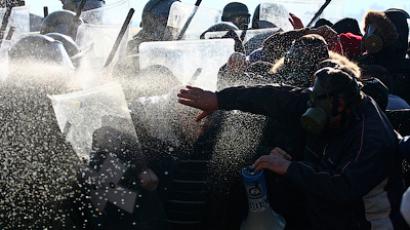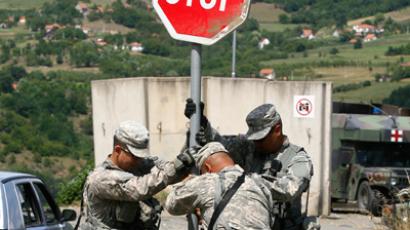Kosovo unlikely to become a UN member - UNGA president to RT
Vuk Jeremic says his election shows confidence in Serbia's global outlook, 20 years after the country was suspended from the General Assembly. But as for Kosovo, he does not expect it to ever become a UN member, Jeremic told RT.
RT:You have assumed the presidency position in a very difficult time. These days many would argue that the UN is dealing with somewhat of a crisis in confidence. Many see the institution as a stage where the disagreements are more often displayed rather than all parties seeking or coming to any kind off agreement or solution. The most obvious example here is the crisis in Syria. Is the UN more about preventing international military intervention rather than resolving conflicts?Vuk Jeremic: What I witnessed in the last few weeks was delegation after delegation and I had a chance to talk to almost everybody in the last couple of weeks. RT:91 bilateral meetings…VJ: It was 91 bilateral meetings in a week. It was a pretty tall order – I tried to put forward the necessity to act swiftly and to act so that violence is stopped now. In my opinion the political future of Syria is to be decided first and foremost by the Syrian people. I believe it is strategically important, very important for the world, but it has to come second to desiccation of the violence and hostilities. We just went to the General debate which a high-level segment of the session of the General Assembly, when all the world leaders come and they spend one week in one building. In the situation of Syria, where 100, 200, sometimes even 300 die per day, and all the world leaders come, they meet in one building and they go away to their respective capitals and very little or nothing is actually done. I think, and it is my personal opinion, it is of fairly monumental proportions. Now, this is the best institution that we have – the United Nations. It has many flaws. It’s got to be reformed; it’s got to be revitalized. We’ve got to be very careful as how we do it, because we must not now break what we have, because what we have right now is the best, multilateral institution in the world with some kind of rules, that in my opinion, need to be respected.RT:UNGA debate probably is the only time when you have all these powerful leaders in one building at one time.It is a rare occasion when delegations such as the US delegation, the Iranian delegation are able to speak directly, if they want to. Do they or adversaries, countries that don’t necessarily get along, seize the opportunity to its full potential?VJ: No. My feeling is that this is just not being used to its full potential. I did try to talk to everybody and when I asked them did you have a chance to talk to this or those particular interlocutors that is very relevant and happens to be truly antagonistic, they said no. And then I was trying to be nice and asking why is that you didn’t use this opportunity, because when are you going to have another opportunity, maybe next September? Actually, their political and I would say short-term political considerations, are mostly derived from domestic politics, preventing those people from using the UN General Assembly meeting to its full potential. RT:General Assembly resolutions are not binding on states, even less binding on individuals. From what I understand the GA is going to be considering an anti-blasphemy resolution, a resolution proposed in the aftermath of the violent reaction on the anti-Muslim film made in the US. If adopted, what can it achieve?VJ:The decisions of the General Assembly carry significant moral weight. And given that they are reached within the universal representation of mankind, I think they carry a very-very special message with regard to blasphemy, something that in my opinion can affect stability in the entire world. And it goes really to the heart of the frictions that are in many ways coloring the security, economic and geopolitical situation of today. There are a lot of people who have different points of view on this issue and it’s mainly the religious feeling versus that of freedom of speech. As a president of the General Assembly I will do my best to work with all sides, all parties to this debate and the General Assembly, to make sure that the 67th session resolution on blasphemy does carry significant moral weight and is backed by a vast majority.RT:You have laid out priorities for your presidency, including revitalizing the General Assembly. There are many ways in which you planned to do that. One specifically which is set out for me is that when you spoke of merging this divide which you say exists with the GA – the G173 versus the G20. Can you elaborate on what this divide and how you plan on merging it. VJ: The G20 is an informal group of countries that got themselves together and started working together in order to discuss how to improve the world economic governance. The rest of the worlds – 173 countries – are not part of this debate. There are lots of suspicions; there are lots of tensions standing out of this fact. There are these 20 guys who are working together closely in order to change things and what they decide actually influences the whole of mankind. One of the flagship initiatives of the Serbian presidency of the General Assembly is actually a creation of a consultative mechanism between the G20 and the rest of the world. So that on one side, 173 countries, who are not part of the G20, can contribute with their thoughts and ideas to the G20 and the G20 can actually benefit from the insight of those 173 and in turn be able to better answer questions related to the legitimacy of the G20. It will make the General Assembly the place for economic discourse, for the discourse of one of the most important topics in today’s world. And I very much hope that Serbia and Russia can work closely together and make it happen, because Serbia is presiding over the General assembly this year and Russia is presiding over the G-20. RT:You are the youngest person to ever be elected to the position of the General Assembly President. If you don’t mind me saying, you are 37 years old. What kind of message do you think this sends to young people around the world, but specifically those in Serbia?VJ: In a way I believe, this was a vote of confidence on Serbia’s place in the world. Twenty years ago our country was actually pushed out of the General Assembly. We were suspended from the membership in the General Assembly almost exactly 20 years to the date, when Serbia took over presidency in 2012. We went through a lot of difficulties. We have had in the last few years some very complicated diplomacy to conduct- at times this has been confrontational. But I think we did a very good job in the end, we presented a confident Serbia, able to be a constructive member of the international community. We won this vote and want to make the best out of it in order to show that Serbia is capable of contributing to world’s peace and stability and working very closely with the rest of the world in pushing the priorities of mankind. RT:I want to ask you about an issue involving Kosovo. The European Commission released its report on the EU’s enlargement strategy in 2012 with respect to Serbia. The European Commission has called on Serbia to respect the “territorial integrity of Kosovo”. The report clearly implies it is an independent state. That is despite the fact that Kosovo unilaterally declared independence in 2008 and still remains under the administration of the United Nations. What do you make of this report?VJ: it is a report in the context of Serbia’s accession to the European Union and of course it is down to the Serbian government to decide how to deal with these findings and these recommendations. I am no longer part of the Serbian government. I fully trust the Serbian government that they are going to treat it in the way that is in line with Serbia’s constitution and with the overwhelming democratic will of the Serbian people. But when it comes to the territorial integrity as well as sovereignty, here in the UN we are about respecting the sovereignty and territorial integrity of countries, of member states.Serbia is such a member state, Kosovo is not and I don’t expect it ever to become one. So my job is to worry about sovereignty and territorial integrity of the UN member states, including Serbia. Kosovo is an internal affair of Kosovo, corroborated by the Security Council. The perimeters of this are set out in the Security Council resolution 1244.














